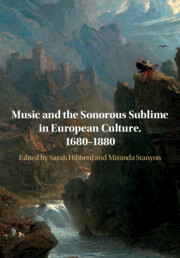Book contents
- Music and the Sonorous Sublime in European Culture, 1680–1880
- Music and the Sonorous Sublime in European Culture, 1680–1880
- Copyright page
- Dedication
- Contents
- Figures
- Musical Examples
- Acknowledgements
- Contributors
- Sonorous Sublimes: An Introduction
- 1 Thunder or Celestial Harmony: French Theological Debates on the Sonorous Sublime
- 2 ‘A Pleasing Rape’: John Dennis, Music and the Queer Sublime
- 3 The Idea of the Past in Eighteenth-Century British Music
- 4 C. P. E. Bach and the Neoclassical Sublime: Revisions of a Concept
- 5 Cherubini’s Médée and Sublime Vengeance
- 6 When Does the Sublime Stop? Cavatinas and Quotations in Haydn’s Seasons
- 7 Counterfeits, Contraltos and Harmony in De Quincey’s Sublime
- 8 The Consecration of Sound: Sublime Musical Creation in Haydn, Weber and Spohr
- 9 Commanding Performances: Opera, Surrogation and the Royal Sublime in 1848
- 10 Wagner’s Sublime Effects: Bells, Cannon and the Perception of Heavy Sound
- Bibliography
- Index
3 - The Idea of the Past in Eighteenth-Century British Music
Published online by Cambridge University Press: 30 April 2020
- Music and the Sonorous Sublime in European Culture, 1680–1880
- Music and the Sonorous Sublime in European Culture, 1680–1880
- Copyright page
- Dedication
- Contents
- Figures
- Musical Examples
- Acknowledgements
- Contributors
- Sonorous Sublimes: An Introduction
- 1 Thunder or Celestial Harmony: French Theological Debates on the Sonorous Sublime
- 2 ‘A Pleasing Rape’: John Dennis, Music and the Queer Sublime
- 3 The Idea of the Past in Eighteenth-Century British Music
- 4 C. P. E. Bach and the Neoclassical Sublime: Revisions of a Concept
- 5 Cherubini’s Médée and Sublime Vengeance
- 6 When Does the Sublime Stop? Cavatinas and Quotations in Haydn’s Seasons
- 7 Counterfeits, Contraltos and Harmony in De Quincey’s Sublime
- 8 The Consecration of Sound: Sublime Musical Creation in Haydn, Weber and Spohr
- 9 Commanding Performances: Opera, Surrogation and the Royal Sublime in 1848
- 10 Wagner’s Sublime Effects: Bells, Cannon and the Perception of Heavy Sound
- Bibliography
- Index
Summary
Musical historicism developed earlier in Britain than, it seems, elsewhere in Europe, with a variety of institutions, traditions and politicised practices from the 1720s onwards cultivating a spirit of enquiry into and appreciation of the past. Seemingly ubiquitous in mid-century musical life, Handel was key to these developments in many ways. Unsurprisingly then, contemporary assessments sought to situate him in an implicitly historicist narrative. In so doing, these assessments often turned to the language of the sublime to place this ‘Man-Mountain’ of a composer in the sweep of history. Indeed, the rhetoric of the sublime seemed to enable and condition the historicist assessment of Handel, entangling musical sublimity with historical greatness. It follows that those composers who came after Handel, particularly in genres where he was pre-eminent, would also aspire to sublimity in order to achieve greatness. Because of the link between historicism and sublimity, they often did this, as examples from William Hayes, Thomas Arne and Thomas Linley (junior) show, by citing and thereby historicising Handel himself.
- Type
- Chapter
- Information
- Publisher: Cambridge University PressPrint publication year: 2020

